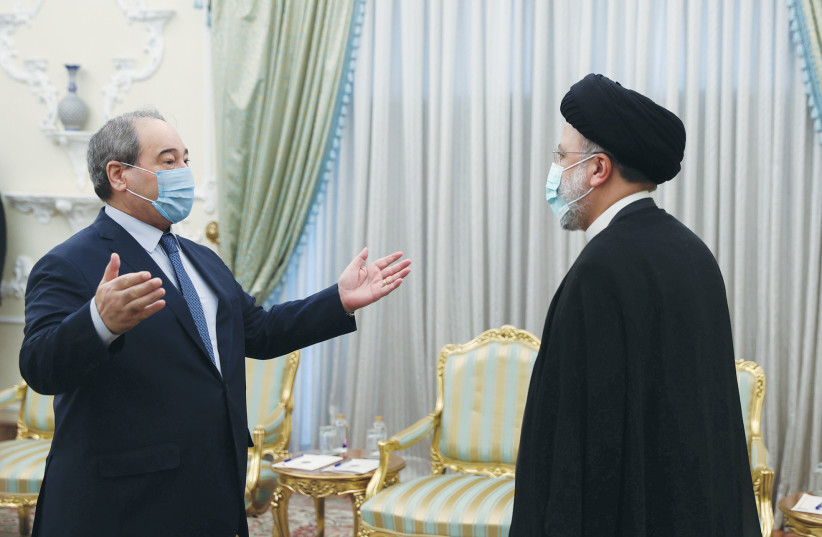CIA Director William Burns on Tuesday told the US House Intelligence Committee that regardless of the outcome of the nuclear negotiations with the world powers in Vienna, Iran will continue to present a threat throughout the Middle East.
Burns noted that for “many years, I negotiated these issues with the Iranians... we are mindful of the fact that the Iranian regime poses not only a nuclear or missile issue but also a threat across the Middle East and to our partners in the Middle East. Regardless of how negotiations go, those threats will continue.”
FBI Director Christopher Wray on Tuesday publicly explained to the US House Intelligence Committee that his agency had purchased NSO Group’s Pegasus cellphone hacking program in 2019 in order to conduct counterintelligence.
Wray started off by saying, “the FBI has not and did not use the NSO products operationally in any investigation. I can confirm that we bought a limited license for testing and investigation. We routinely evaluate technologies that are out there: what are the security concerns raised by those products?
Asked why the FBI would test such a product if there was no intention to use it, Wray responded, “we test and evaluate all sorts of technology products that if in the wrong hands can be used against our agents.”

The purpose would be to enhance the FBI’s “counterintelligence security perspective that bad guys can use against our people.”
Questioned if he would promise to never use NSO’s technology in the future, Wray responded, “we decided not to use it, even before the current brouhaha,” referring to a long list of scandals which have hit NSO since July 2021.
In February, the FBI’s purchasing of Pegasus was revealed in multiple media reports, but this was the first time that an official, here the FBI Director himself, publicly addressed the issue.
Later, US Congressman Joaquin Castro pressed the officials to crack down on Israel for what we called its responsibility for unleashing a variety of cyber offensive firms like NSO.
He asked the officials if any of them had personally pressured Israel on the issue, and they responded that they had not, but that other American officials might have.
In November, the US Commerce Department blacklisted NSO, Candiru and other cyber offensive firms.
Regarding threats by Russian President Vladimir Putin to use nuclear weapons against the US and NATO if they militarily intervene in his Ukraine War, top US intelligence officials gave somewhat disparate messages.
They were also all questioned about what the implications were of new, more advanced Russian nuclear weapons, some of which the US may not yet have matched.
Defense Intelligence Agency Director Scott Berrier said that Putin “thinks that [advanced nuclear weaponry] gives him a tactical advantage. When he says something, we should take him at his word.”
On the flip side, US Director of National Intelligence Avril Haines said that while US intelligence took Putin very seriously, they had also analyzed movements of Russia’s nuclear forces and had seen no change.
While Haines did not come straight out and say that Putin so far was bluffing, it was clear that she did not think he had taken any real actions toward a nuclear escalation.
Burns suggested that Russian doctrine was to escalate in a fight and that Moscow could conceivably use nuclear weapons, but only in the theoretical scenario where the US or NATO were weighing entering the Ukraine war militarily (which they are not.) Burns did not see Putin responding with nuclear warfare against non-military US aid to Ukraine.
Earlier Tuesday, the US intelligence community released its annual worldwide threats report, stating “Tehran will try to leverage its expanding nuclear program, proxy and partner forces, diplomacy, and military sales and acquisitions to advance its goals. The Iranian regime sees itself locked in an existential struggle with the United States and its regional allies, while it pursues its longstanding ambitions for regional leadership.”
Further, the report said, “The election of President Ebrahim Raisi in 2021 has invigorated Supreme Leader Ali Khamenei to try to make progress toward his long-term vision of molding Iran into a pan-Islamic power capable of defending global Muslim causes while tightening its theocratic rule at home.”
“We assess that Iran will threaten US persons directly and via proxy attacks, particularly in the Middle East. Iran also remains committed to developing networks inside the United States—an objective it has pursued for more than a decade,” said the report.
The report also described Iran as a threat to Israel, and devoted significant attention to threats from China, Russia, North Korea and cyber threats generally.
